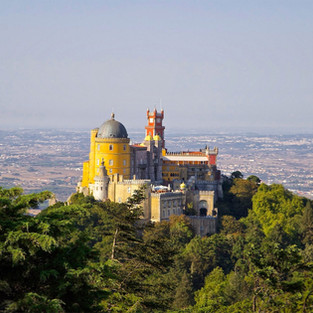Destination: Sintra
- Catarina Varão

- Nov 12, 2020
- 3 min read
Updated: Apr 14, 2021
There are few places in this world that resemble Paradise. Sintra is, since the fall of the Babylon in the ancient era, the only garden of Eden that has come to our times. Named ''Monte da Lua'' (Moon Hill) by the Romans, the most sumptuous Lusitanian hill hides has many secrets as humanity itself. The Arabs, who planted here the essence of Sintra soul, discovered the portal to the seventh heaven and, unable to cross it, implemented his vision in a cryptic and masterful architecture, enhanced by centuries of mysticism, of which even nature itself insists to show with its Sebastianist mist and ghostly light.
The town of Sintra is simultaneously in the middle of nowhere and close to everything. Full of antitheses, one lives in the country with the resources of the city. From the splendid mountain, unique example of integrity, are also born beautiful beaches whose seas invited the Portuguese to the Great Discoveries. As if it was taken from a fairy tale, its architectural beauty, harmoniously inseparable from the landscape, is simply indescribable. Wherever you look, the art stands out in all its forms, of all ages and all styles. Countless poets in love, illustrious painters, skilled sculptors and the wisest writers struggled for the best description of this paradise on earth. Whoever comes to Sintra might think that entered in the last century, with the certainly, however, that its inhabitants live in a world of future.
Sintra is perhaps the most beautiful and enigmatic villages in the world.The castles, palaces, cottages, churches, museums and many other monuments around every corner are full of symbolism. Sintra surprises, more than with its beauty, with its mystery. And for those who are fascinated, they must stop at Quinta da Regaleira, with its Philosopher's Mansion, which for many years served as home for the legendary guardians of the greatest treasure of Christianity, religiously house there very close to the Holy Grail Castle (best known for Pena Palace). Says Sintra prophecy that those who were born here, might be for mission or for punishment, although personally I say it's for both - the mission of preserving our land and the punishment of losing all the desire to travel.
And it is all these anecdotes and legends that makes the soul of who lives here, as or more important than anything else, because coming to Sintra is also visiting and meeting its people, as modest as haughty. It's hearing a ''good morning'' and a ''see you soon'' wherever you go. It's the kindness to ask for a favor and the kindness to thank. It's to get a coffee and find out that they were talking about music and not football. It is to discover a lively and cheerful land, full of festivals, concerts, theatres and exhibitions. It is to experience the typical gastronomy and fall in love with the Travesseiro and the Queijadinha, served with tea at four o'clock. It is all this and much more. Above all, it's the will to come back.
I was asked to write this in the most informal way possible. Forgive me, my friends, but to be born in Sintra it's to be formal, it's to speak as if we were in the time of the feudalism, with all its perks, but with lightness and futuristic liberalism. It is to be simultaneously retrograde and progressive, it is to be traditionally avant-garde and, above all, it is to live and let live, always true to ourselves and to our customs, with deep love for this piece of land that is certainly the most beautiful gem of the Portuguese crown.















Comments